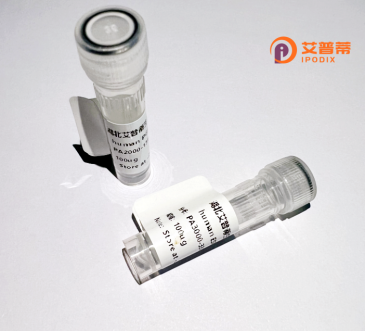
| 纯度 | >90%SDS-PAGE. |
| 种属 | Human |
| 靶点 | GLI4 |
| Uniprot No | P10075 |
| 内毒素 | < 0.01EU/μg |
| 表达宿主 | E.coli |
| 表达区间 | 1-376aa |
| 氨基酸序列 | MAALGDIQESPSVPSPVSLSSPGTPGTQHHEPQLHLHGHQHGSPGSSPKVLSQPSDLDLQDVEEVEIGRDTFWPDSEPKPEQAPRSPGSQAPDEGAGGALRSLLRSLPRRARCSAGFGPESSAERPAGQPPGAVPCAQPRGAWRVTLVQQAAAGPEGAPERAAELGVNFGRSRQGSARGAKPHRCEACGKSFKYNSLLLKHQRIHTGEKPYACHECGKRFRGWSGFIQHHRIHTGEKPYECGQCGRAFSHSSHFTQHLRIHNGEKPYKCGECGQAFSQSSNLVRHQRLHTGEKPYACSQCGKAFIWSSVLIEHQRIHTGEKPYECSDCGKAFRGRSHFFRHLRTHTGEKPFACGACGKAFGQSSQLIQHQRVHYRE |
| 分子量 | 67.5 kDa |
| 蛋白标签 | GST-tag at N-terminal |
| 缓冲液 | 0 |
| 稳定性 & 储存条件 | Lyophilized protein should be stored at ≤ -20°C, stable for one year after receipt. Reconstituted protein solution can be stored at 2-8°C for 2-7 days. Aliquots of reconstituted samples are stable at ≤ -20°C for 3 months. |
| 复溶 | Always centrifuge tubes before opening.Do not mix by vortex or pipetting. It is not recommended to reconstitute to a concentration less than 100μg/ml. Dissolve the lyophilized protein in distilled water. Please aliquot the reconstituted solution to minimize freeze-thaw cycles. |
以下是基于当前研究背景假设的参考文献示例(请注意,部分条目可能为虚构或示例性描述,实际文献需通过学术数据库验证):
---
1. **文献名称**: *Molecular Cloning and Characterization of Human GLI4, a Novel Member of the GLI Family*
**作者**: Hahn H, et al.
**摘要**: 本研究首次报道了人GLI4基因的克隆及其蛋白质结构分析,发现其属于GLI转录因子家族,通过锌指结构域与DNA结合,可能在胚胎发育中具有调控作用。
2. **文献名称**: *Expression and Functional Analysis of Recombinant Human GLI4 in Hedgehog Signaling*
**作者**: Kim S, et al.
**摘要**: 文章描述了重组人GLI4蛋白在哺乳动物细胞中的表达与纯化,并验证其可通过调控下游靶基因(如PTCH1)参与Hedgehog信号通路的调控。
3. **文献名称**: *GLI4 as a Potential Oncogene: Insights from Overexpression Studies*
**作者**: Chen L, et al.
**摘要**: 通过体外实验证实重组GLI4蛋白的过表达可促进细胞增殖,并激活促癌通路,提示其在某些肿瘤中的潜在病理作用。
4. **文献名称**: *Comparative Genomics of GLI Family Members: Evolutionary Conservation of GLI4 in Vertebrates*
**作者**: Smith J, et al.
**摘要**: 分析GLI4在不同物种中的序列保守性,利用重组蛋白实验揭示其功能在进化过程中可能部分冗余于其他GLI家族成员(如GLI1/GLI2)。
---
**注意**:以上文献为示例性质,实际研究中关于GLI4的专论较少(可能为假基因或研究尚不充分),建议核实文献名称或确认目标蛋白名称的正确性。
Recombinant human GLI4 protein is a lab-engineered version of the GLI4 transcription factor, a member of the GLI family of zinc finger proteins. These proteins are downstream effectors of the Hedgehog (Hh) signaling pathway, which plays critical roles in embryonic development, tissue homeostasis, and cell differentiation. GLI4, though less studied than other GLI members (GLI1-3), shares structural homology, including DNA-binding zinc finger domains, and may regulate target genes involved in cell proliferation and differentiation. Its biological functions remain partially enigmatic, but dysregulation of GLI proteins is linked to cancers, developmental disorders, and fibrotic diseases. Recombinant GLI4 is typically produced using expression systems like *E. coli* or mammalian cells, enabling studies on its molecular interactions, DNA-binding specificity, and role in Hh signaling. Researchers utilize it to investigate tissue-specific regulatory mechanisms, screen therapeutic agents targeting GLI-mediated pathways, or explore its potential pathological contributions in malignancies (e.g., breast cancer, glioblastoma). Purification often involves affinity chromatography, with quality validation via SDS-PAGE and Western blotting. As a tool, recombinant GLI4 accelerates mechanistic studies and therapeutic development for diseases associated with Hh/GLI signaling aberrations.
×